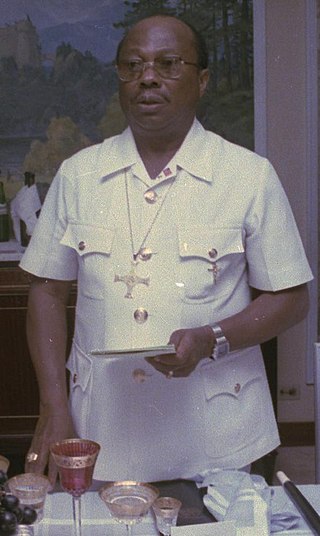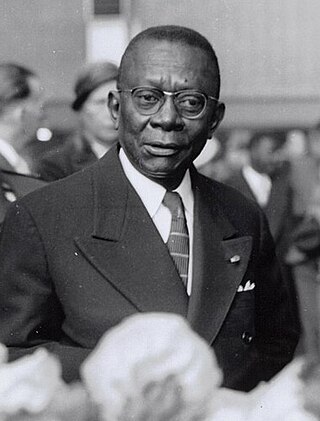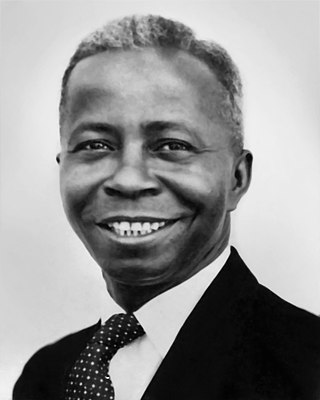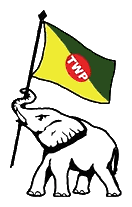
Liberia is a country in West Africa founded by free people of color from the United States. The emigration of African Americans, both freeborn and recently emancipated, was funded and organized by the American Colonization Society (ACS). The mortality rate of these settlers was the highest among settlements reported with modern recordkeeping. Of the 4,571 emigrants who arrived in Liberia between 1820 and 1843, only 1,819 survived (39.8%).

The Politics of Liberia takes place in a framework of a presidential representative democratic republic modeled on the government of the United States, whereby the President is the head of state and head of government; unlike the United States, however, Liberia is a unitary state as opposed to a federation and has a pluriform multi-party system rather than the two-party system that characterizes US politics. Executive power is exercised by the government. Legislative power is vested in both the government and the two chambers of the legislature.

Samuel Kanyon Doe was a Liberian politician who served as the 21st President of Liberia from 1986 to 1990. He ruled Liberia as Chairman of the People's Redemption Council (PRC) from 1980 to 1986 and then as president from 1986 to 1990.

The president of the Republic of Liberia is the head of state and government of Liberia. The president serves as the leader of the executive branch and as commander-in-chief of the Armed Forces of Liberia.

William Richard Tolbert Jr. was a Liberian politician who served as the 20th president of Liberia from 1971 until his assassination in 1980.

William Vacanarat Shadrach Tubman was a Liberian politician. He was the 19th president of Liberia and the longest-serving president in the country's history, serving from his election in 1944 until his death in 1971.

The People's Redemption Council (PRC) was a governmental body that ruled Liberia during the early 1980s. It was established after the 1980 Liberian coup d'état wherein Samuel Doe seized power on 12 April 1980. The Council, with Doe as its chairman, promised a complete overhaul of Liberia's society, economy, and political system and the replacement of the corruption of previous regimes with respect for the rights of the Liberian people. The PRC had 17 founding members and was later expanded to 28. The PRC initially functioned as the executive and legislative body in Doe's government. However, over time Doe consolidated power as a central executive. In 1984, the PRC was dissolved and replaced by the Interim National Assembly.

George Henry Andrews was a Liberian sports journalist and later minister of Tourism and Cultural Affairs of Liberia. He presided over a pivotal election in the 1990s.

General elections were held in Liberia on 15 October 1985. They were the first elections since the 12 April 1980 military coup that brought Samuel Doe to power. During 1984, a new draft constitutional was approved in a referendum, which provided for a 58-member civilian and military Interim National Assembly, headed by Samuel Doe as president. After a ban on political parties was lifted, four parties – Doe's National Democratic Party (NDP), the Liberian Action Party, the Unity Party and the Liberia Unification Party – contested the elections.
Sekou Damate Conneh, Jr. is a Liberian politician and former rebel leader.

Winston A. Tubman is a Liberian diplomat and politician of Americo-Liberian descent. He is a former justice minister and diplomat for the nation, as well as having been the standard bearer of the Congress for Democratic Change (CDC).
William Vacanarat Shadrach Tubman Jr. is a Liberian politician and member of the Reformed United Liberia Party (RULP). He is the son of William Tubman, who was President of Liberia from 1943 to 1971, and the son-in-law of his father's successor, William R. Tolbert Jr., whose daughter Wokie he married.

General elections were held in Liberia on 1 May 1951, the first to be held under universal suffrage; previously only male descendants of Americo-Liberians had been allowed to vote. This was the first elections in Liberia where women and the local Liberians owning property were allowed to vote based on a Constitutional Referendum in 1945–46. In the presidential election, William Tubman of the True Whig Party was the only candidate, and was re-elected unopposed.
Frank Emmanuel Tolbert was a Liberian politician and brother of President William R. Tolbert, Jr. The oldest son of William R. Tolbert Sr., national chairman of the ruling True Whig Party, he grew up in Bensonville, attended Zion Praise Baptist Church, graduated from Liberia College, and became involved in politics relatively early in life. As his family became more and more closely connected to the family of Supreme Court Justice William V.S. Tubman, Frank began to become prominent: when Tubman ran for President in 1943, he was rumoured to be Tubman's first choice for Vice President, although his younger brother William was eventually chosen, perhaps because of Frank's unpredictable moods and violent temper.

The 1980 Liberian coup d'état happened on April 12, 1980, when President William Tolbert was overthrown and murdered in a violent coup. The coup was staged by an indigenous Liberian faction of the Armed Forces of Liberia (AFL) under the command of Master Sergeant Samuel Doe. Following a period of transition, Doe ruled Liberia throughout the 1980s until his murder in 1990 during the First Liberian Civil War.

Edison Reginald Townsend was a Liberian journalist and statesman known for the establishment of Liberia's Information Services. He served as Secretary of Information and Cultural Affairs under President William Tubman, and as Minister of State for Presidential Affairs under President William Tolbert. In 1979 he was elected National Chairman of the True Whig Party. Following the 1980 Liberian coup d'état of President Tolbert on April 12, 1980, he and several other members of the Tolbert administration were put on trial and without due process executed by firing squad on April 22, 1980.

Americo-Liberian people, are a Liberian ethnic group of African American, Afro-Caribbean, and liberated Africans. Americo-Liberians trace their ancestry to free-born and formerly enslaved African Americans who emigrated in the 19th century to become the founders of the state of Liberia. They identified themselves as Americo-Liberians.

Liberia–Soviet relations were the bilateral relations between Liberia and Soviet Union. Contacts between the two countries were sporadic during the 1950s and 1960s, improved during the 1970s but became frosty in the 1980s.

Didwho Welleh Twe was a Liberian politician. He became a representative in the Liberian legislature and a presidential candidate in the 1951 Liberian general election. A review of his life shows that he was an advocate of Liberian native rights and the first Liberian of full tribal background to officially and openly seek the Liberian presidency. Since 1847, the country was ruled by descendants of American former Black slaves known as Americo-Liberians until 1980. The descendants constitute less than ten percent of the population.

Israel-Liberia relations refer to the bilateral relations between the State of Israel and the Republic of Liberia. Liberia was one of the United Nations member states to vote in favor of establishing a Jewish state in Palestine in 1947. Israel and Liberia established relations in the late 1950s. The administration of William Tolbert severed ties with the Israeli government in 1973 in response to the Yom Kippur War, but they were re-established in 1983 by Samuel Doe, who succeeded Tolbert via coup.

















